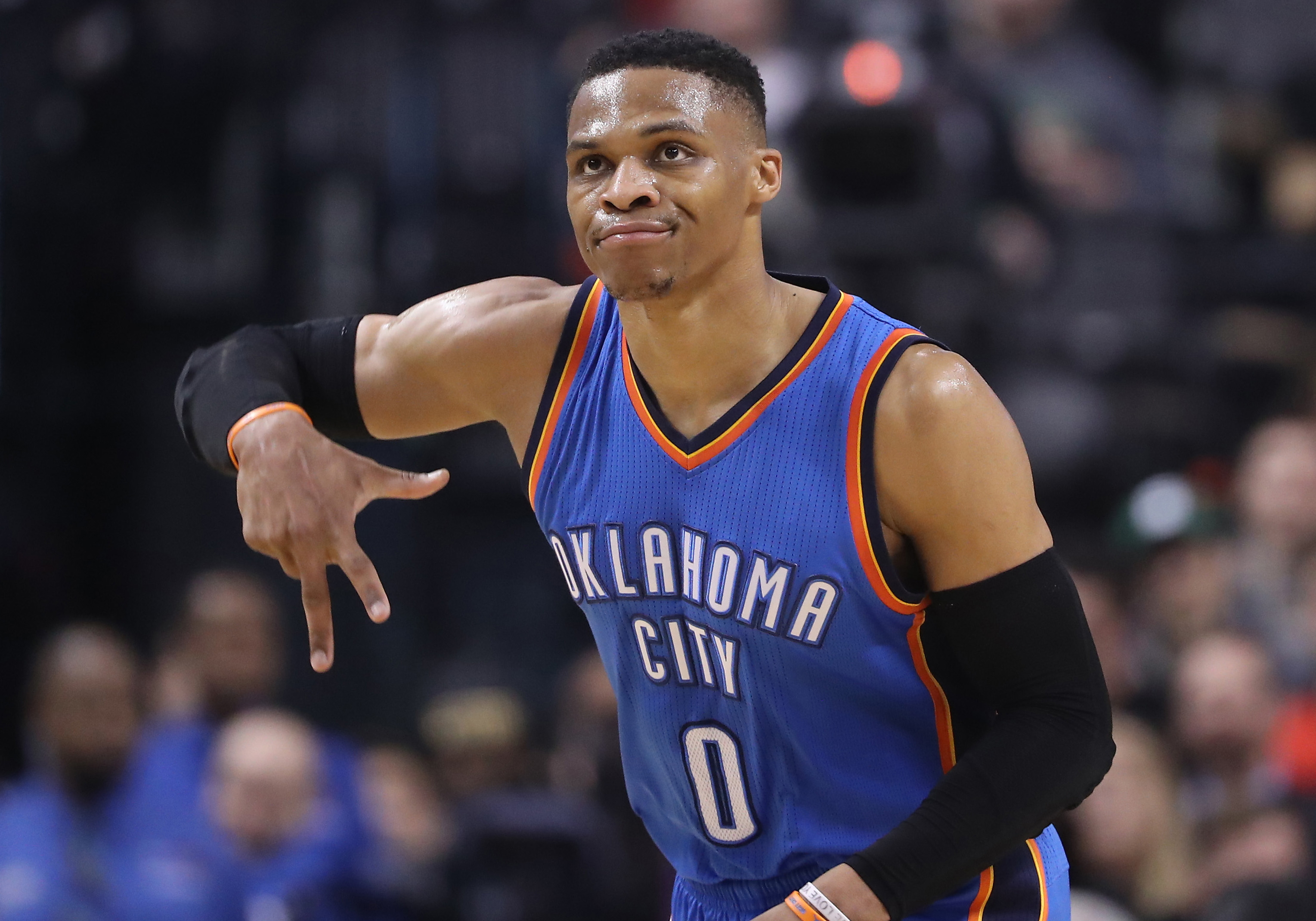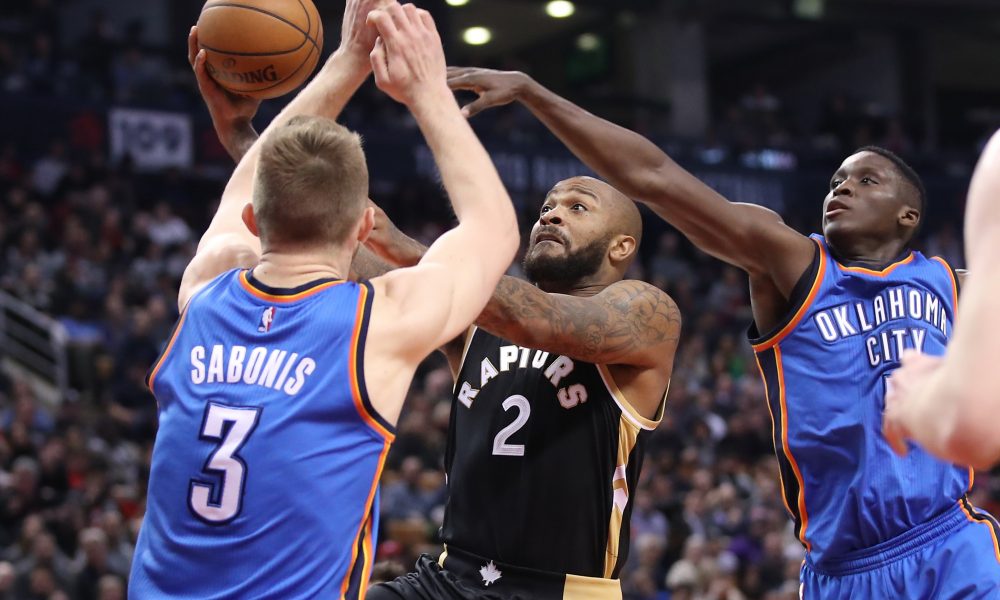Raptors 102, Thunder 123 | Box Score | Quick Reaction | Reaction Podcast
With Russell Westbrook in town and the league’s Most Valuable Player discussion heating up, the talk in the days leading up to Thursday’s game centered around what, exactly, it means to be valuable.
In the case of Westbrook, his value is derived from an unending energy reserve, from the unstoppable, perpetual downward force he creates, bending opponents in such ways that those around him, a cast of quality defenders low on offensive talent, can thrive and occasionally raise the team to Westbrook’s singular level. He also puts up a lot of stats. Like, a lot. There are other definitions, too. The two-way play of a Kawhi Leonard, the system-defining artistry of a James Harden, the CM Punk-screaming “best in the world”-ness of LeBron James. Westbrook also has a remarkably strong on-off impact, even if the highs of the Thunder are not as high as those of some of his MVP competitors.
Value can be a more subjective feel thing, too. For weeks now, the Raptors have learned about the value of Kyle Lowry through experiencing his prolonged absence. The team has stayed afloat – a nod to the value of DeMar DeRozan – but they’ve done so in a somewhat ugly, tenuous fashion that’s been cause for more consternation than a 6-5 record without an All-Star might otherwise implore. Perhaps it’s the time of year. Perhaps it’s that the losses have been uglier, or that they’ve been just as ugly, a reminder that this team has long since lost its cloak of unassailable, intangible invincibility in the face of blowouts, a firm unwillingness to submit, and a resolve they built their identity on. The team started losing ugly while Lowry was still healthy, and while that seems an odd inclusion while discussing his importance, it helps explain the collective anxiety yet another squashing brings about.
Squashing is really the only word for it. The Raptors failed to show up against the Thunder, and Westbrook and company steamrolled them. It was, in the words of head coach Dwane Casey, “embarrassing,” eliciting an apology to fans and a team meeting afterward. The Raptors now find themselves searching for answers – players who will give a complete effort, a rotation that doesn’t lead to long stretches of inattentiveness, anyone at all who can knock down a three – and it’s telling that one of the new voices has to speak up the loudest to try to awaken a team that’s spent the bulk of the season foolishly trusting cruise control.
“We can’t have efforts like this, we can’t come out and play like this,” P.J. Tucker said after the game. “It’s not about making shots, it’s not about offense, it’s about us having a competitive spirit, coming out and treating all these games like playoff games. We’re trying to place ourselves in good position going into the playoffs and having nights like this can’t happen.”
Outside of DeRozan’s continued excellence against enormous pressure, the Raptors’ offense has been expectedly shaky. For glimpses Thursday, they moved the ball a little better, with wings cutting and bigs diving hard. Their 21 free-throw attempts in the first half came primarily from sound movement. The issue, though, is that the Thunder were able to pack the paint all night, taking away the option to dive strong, room to cut into, and paths to the rim. With the Raptors’ shooters continuing to prove woefully inept from outside – both Lowry’s gravity assisting DeRozan as a spot-up threat and his ability to pull-up from 30 feet in transition are sorely missed – the Thunder felt no need to stay at home on shooters. The Raptors finished 5-of-20 from long-range, and the Thunder played off the arc to an embarrassing, frustrating degree.
It’s been written multiple times here that the formula for the Raptors requires DeRozan’s excellence, role players to step up, and the energy level needs to be extreme. That DeMarre Carroll and Patrick Patterson have conspired to slump at the same time through apparent sub-100 percent health, and that Serge Ibaka played his worst game as a Raptor opposite his former team, certainly did not help. Norman Powell tried to answer the Westbrook call on defense and at least made life hard, but DeRozan and Cory Joseph had little help before the game was decided.
And that effort thing? It was decidedly not a part of the formula in this one. They came out flat from the outset, apparently shocked by a stout Thunder defense that’s been stout all year, and it was only an all-bench unit – a terrible idea on paper and in small samples so far – that brought some life. It was fleeting, too, with the segments of the game sandwiching halftime seeing the Raptors all but roll over.
“It started at the beginning of the game,” Casey said. “Our transition defence was non-existent, we talked about it, we worked on it. We worked harder in practice than we did in the game. That’s what’s disappointing. Somehow, some way, myself and the staff we’ve got to find a competitive edge. We don’t wait until the playoffs start, it starts now.”
It was, coming off two off-days, at home, with seeding implications, and with an MVP candidate coming in to their building, pretty inexcusable. When Westbrook checked back in for his second-quarter stint, he promptly broke the Raptors. That he played just 28 minutes, put up a 24-10-16 triple-double, and barely broke a sweat while tapping the Raptors out, says a lot about both sides. He bludgeoned, he hammered, and he forced. The Raptors are built on having the guile, savvy, and resilience to fight back against such attacks, and it’s been found wanting far too often this season.
When we talk about value, it sometimes goes beyond just the numbers. Lowry and DeRozan together represent the foundations this team’s success has been built on, and whatever your remaining faith in that design – there is still reason for optimism that a Lowry return will right the ship, however unsightly this defeat – the team’s confidence is prone to wilt without it. It was shaking before the trade deadline, and the acquisitions of Ibaka and Tucker were supposed to help fortify it, not simply help duct-tape things together until Lowry returns and the team gets a week or two to rush a new comfort level, chemistry, identity, or whatever it is they’ll be searching for 10 games from now.
The Raptors have been surviving, on record, which is all that can really be asked, aside from trying (a lot) harder in defeat. But when you’re just in survival mode and run into an opponent who feels wronged by the entire NBA establishment and is out for blood, laying waste to anyone who raises an eyebrow on his tour for vengeance, let alone tries to protect a rim from his oncoming assault, who is making the scientifically improbable and mathematically remarkable an every night occurrence, well…you’ve seen, like, a tiny rodent in survival mode against a snake, yes? It looks vaguely like this:
This might be my favorite Russell Westbrook play of the season. What a pass pic.twitter.com/OZ1tPs8Dk5
— Fred Katz (@FredKatz) March 17, 2017
Until the bench crews came in and Pascal Siakam started making it rain with a fun inside-outside showing, the Raptors had little to offer. Little to offer as resistance, little to offer fans, little to offer themselves in terms of a solution. That the focus was on effort makes sense, considering how poor it was, but it’s also always a concern when “try harder” is the solution for poor play. It may very well be the answer, but it’s tough to rely on when it’s been so inconsistent for months, however threatening Tucker’s grumbly tone.
“They wanted this game, we didn’t, period. There’s no two ways around that. They wanted it more than us and they took it,” Tucker said. “A lot of people talked a lot, it was a good conversation but enough talking.”
Enough talking, indeed. Sometimes, a back-to-back is a blessing, with a quick opportunity to erase an awful performance. The Raptors have to hope that’s the case here, because they’re out of weapons when the effort isn’t there and they’re running short on time to put it all back together.



